Latest Ukraine updates: Ukraine imposes state of emergency

- Ukraine declares nationwide state of emergency as fears of war rise.
- US President Joe Biden allows sanctions against the company that built the Nord Stream 2 gas pipeline to move forward.
- UN Secretary-General Antonio Guterres tells the General Assembly the world is “facing a moment of peril” over the Ukraine-Russia crisis.
- European Union sanctions against Russia take effect.
- Kyiv advises nationals to leave Russia and slaps sanctions on hundreds of Russians over Moscow’s recognition of “republics” in eastern Ukraine.
This live blog is now closed, thanks for joining us. Here are the updates for February 23.
Keep reading
list of 4 itemsWhat sanctions have been imposed on Russia?
‘Mariupol won’t give up’: Ukrainians defy Russian invasion threat
Biden imposes new Russia sanctions, decries ‘beginning invasion’
Kuleba says plant in Crimea evacuated
Ukraine’s Foreign Minister Dmytro Kuleba said night-shift workers of the Titan chemicals plant in annexed Crimea had been evacuated from the facility.
He said it was a possible preparation for another staged provocation by Russia, which annexed Crimea in 2014.
“Moscow seems to have no limits in attempts to falsify pretexts for further aggression,” Kuleba wrote on Twitter.
Ukraine announces state of emergency
Ukraine’s parliament has voted to approve a national state of emergency in response to the threat of a Russian invasion.
The measure was overwhelmingly approved on the same day that Moscow began to evacuate its Kyiv embassy and Washington stepped up its warnings about the chances of an all-out Russian attack.
In the Donetsk and Luhansk regions, a state of emergency had already been in place since 2014.
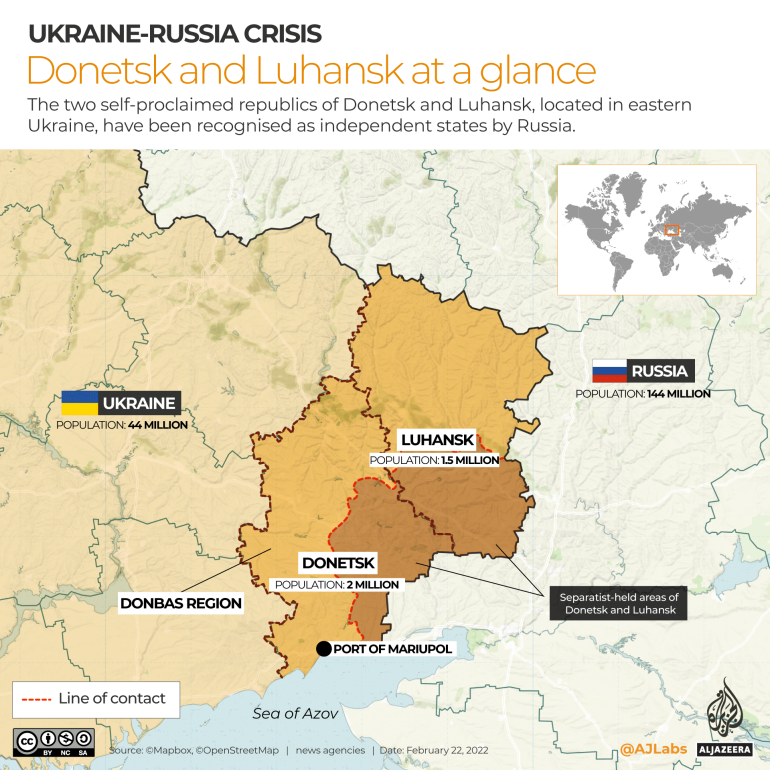
Russia-backed separatist leader suggests Ukraine surrender new territory
The Russian-backed separatist leader of a Ukrainian breakaway region said the Ukrainian government forces should withdraw from territory that his self-proclaimed state lays claim to.
Denis Pushilin, head of the so-called Donetsk People’s Republic, told Russian state media that such a scenario would be the optimal one.
Chinese UN ambassador calls for restraint
China’s ambassador to the United Nations has told the UN General Assembly that Beijing will “continue to engage in dialogue and consultation, and to seek reasonable solutions that address each other’s concerns through peaceful means”.
While calling for a diplomatic solution to the Ukraine-Russia crisis, Zhang Jun noted the situation was rooted in a “complex web” of historical and present-day factors and that “an interplay of those factors has driven the situation to this point”.
US announces Nord Stream 2 sanctions
US President Joe Biden has allowed sanctions to move forward against the company that built the Russia-to-Germany Nord Stream 2 gas pipeline and against the company’s CEO.
“I have directed my administration to impose sanctions on Nord Stream 2 AG and its corporate officers. These steps are another piece of our initial tranche of sanctions in response to Russia’s actions in Ukraine,” Biden said in a statement.
“As I have made clear, we will not hesitate to take further steps if Russia continues to escalate,” he added.
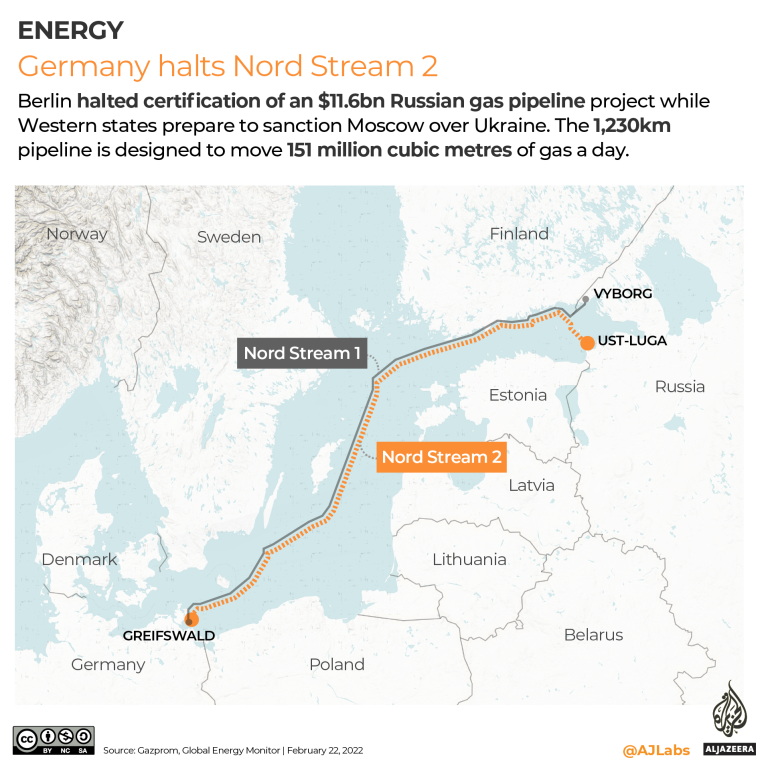
Russian forces near Ukraine ‘ready to go’: US
A senior US defence official in Washington said the Russian forces arrayed along Ukraine’s borders are “as ready as they can be” for an invasion.
Speaking on condition of anonymity, the official was quoted by Reuters and AFP as saying that about 80 percent of those forces are now in “what we would consider forward positions, ready to go”.
US authorities have estimated that Russia has more than 150,000 troops along Ukraine’s borders with Russia and Belarus.
EU ready to impose export controls if Russia moves further into Ukraine
The European Union will be ready to launch a second package of sanctions against Russia, including export controls, if Russian troops move beyond the Ukrainian regions held by Russian-backed separatists.
European Commission Executive Vice-President Valdis Dombrovskis told Reuters the EU has been working on a sanctions package for several weeks and is able to act quickly to step up sanctions in cooperation with the United States, the United Kingdom and other countries.
“Coming with strong sanctions against Russia is going to have some impact on the EU economy and we need to be ready for this,” he said.
Ukrainians defy Russian invasion threat
Hundreds of residents of the once largely pro-Russian city of Mariupol gathered in the central Theatre Square with a defiant message for President Vladimir Putin: Russia is not welcome here.
“I came to show that we love Ukraine and we don’t want Russian ‘peace’ here,” said Andriy Voytsekhovskyy, 28, a painter and skater.
The port city of nearly 500,000 people in the Donetsk region of eastern Ukraine was briefly controlled by the rebels in 2014 and has seen significant waves of violence since.
Read the story here.
US lawmaker says Ukraine will need $1bn in humanitarian aid
US Representative Barbara Lee, chair of the House appropriations subcommittee responsible for US foreign aid, said Ukraine will need humanitarian aid as it faces a buildup of Russian troops near its border.
Speaking at a news conference alongside House Speaker Nancy Pelosi, Lee said the Biden administration had committed to at least $1bn over the next 12 months in the event of conflict.
Switzerland refrains from immediate sanctions against Russia
Switzerland has refrained from imposing sanctions on Russia following its breach of Ukraine’s sovereignty, saying however that it will make sure it not be used to get around punitive measures imposed by the European Union.
“The Federal Council [cabinet] wishes to ensure that Switzerland will not be used as a platform to circumnavigate sanctions imposed by the EU,” it said in a statement.
“It will therefore examine the sanctions and then come to a decision.”
Ukraine crisis: What does Belarus have to gain, and lose?
Belarus President Alexander Lukashenko has a hand in the political games between Moscow, his main backer and sponsor, and Kyiv, reaping enormous political and economic gains.
On Tuesday, a day after Russian President Vladimir Putin recognised breakaway Ukrainian provinces of Donetsk and Luhansk as independent states, Lukashenko urged Ukrainians to “stop” their confrontation with Russia – and abandon their US “masters”.
Read the story here.
EU sanctions hit Russian officials, companies, lawmakers
European Union sanctions against Russia have taken effect, targeting senior government officials, several companies and hundreds of lawmakers who voted in favour of recognising the independence of separatist parts of southeast Ukraine.
The move includes a freeze on the assets of those listed and a ban on them travelling in the 27-nation EU.
EU foreign policy chief Josep Borrell has said the sanctions “will hurt Russia and it will hurt a lot”.
Pyotr Tolstoy, the deputy chairman of the State Duma lower house of parliament, laughed them off and warned that Russia would retaliate with its own measures.
Ukraine’s Kuleba says crisis ‘unilaterally created’ by Russia
Ukraine’s foreign minister has told the United Nations General Assembly that Europe is in the middle of its largest security crisis since World War II.
“This crisis was created and is being escalated by one side unilaterally, by the Russian Federation,” Dmytro Kuleba told the body at its New York headquarters.
“Ukraine has never threatened or attacked anyone. Ukraine has never planned and does not plan any such action,” he added. “Russia’s actions and statements are outrageous, horrific and go far beyond threatening Ukraine. In fact, in his address this week, Russian President Vladimir Putin overtly denied Ukraine’s right to exist.”
Cuba accuses Washington of aggravating tensions
Cuba, a close ally of Russia, has sharply criticised the United States for imposing “the progressive expansion of NATO towards the borders of the Russian Federation” and called for a diplomatic solution to the Ukraine crisis.
Cuba’s foreign ministry said in a statement that Washington, Havana’s longtime rival, had ramped up threats against Putin, aggravating tensions.
“The US government has been threatening Russia for weeks and manipulating the international community about the dangers of an ‘imminent massive invasion’ of Ukraine,” Cuba’s statement said. “It has supplied weapons and military technology, deployed troops to several countries in the region, applied unilateral and unjust sanctions, and threatened other reprisals.”
The remarks came just hours after Russia agreed to postpone debt payments owed to it by Cuba until 2027.
UN chief warns world facing ‘moment of peril’
UN Secretary-General Antonio Guterres has told the organisation’s General Assembly that the world is “facing a moment of peril” over Ukraine’s crisis with Russia.
“If the conflict in Ukraine expands, the world could see a scale and severity of need unseen for many years,” he warned.
EU calls emergency summit
The European Union will hold an emergency summit in Brussels on Thursday evening to discuss Russia’s “aggressive actions” against Ukraine, European Council President Charles Michel has announced in a letter to the bloc’s leaders.
“It is important that we continue to be united and determined and jointly define our collective approach and actions,” he said.
Putin tells Erdogan US, NATO tried to ignore Russia’s security demands: Report
Putin has expressed his disappointment to Turkish President Recep Tayyip Erdogan at what he said were attempts by the US and the Washington-led NATO military alliance to ignore Russia’s legitimate security demands, the Interfax News Agency cites the Kremlin as saying.
In a phone call, Russia’s leader also said he had recognised the independence of two breakaway regions in eastern Ukraine because of what he alleged was Kyiv’s rejection of the Minsk peace agreement, a 2015 deal aimed at ending the conflict in the Donbas region.
Australian foreign minister slams Russia’s ‘peacekeepers’ claim as an ‘obscene perversion’
It is an “obscene perversion” for Putin to speak of Russian soldiers acting as “peacekeepers” in Ukraine, and Australia will not hesitate to impose further sanctions if Moscow escalates the situation further, Australian Foreign Minister Marise Payne says.
“Any suggestions that there is a legitimate basis for Russia’s actions are pure propaganda and disinformation,” Payne told reporters during a visit to Prague.
“The assertion by President Putin of Russian soldiers acting as peacekeepers is indeed an obscene perversion of the noble and vital role that generations of peacekeepers have played across the world,” she added.
Ukrainian government, foreign ministry and parliament websites down
Several Ukrainian state websites, including the government and foreign ministry home pages, are currently inaccessible.
Ukrainian authorities said this week they had seen online warnings that hackers were preparing to launch major attacks on government agencies, banks and the defence sector.
Ukraine has suffered a string of cyberattacks in recent weeks that Kyiv has blamed on Russia. Moscow has denied any involvement in the incidents.
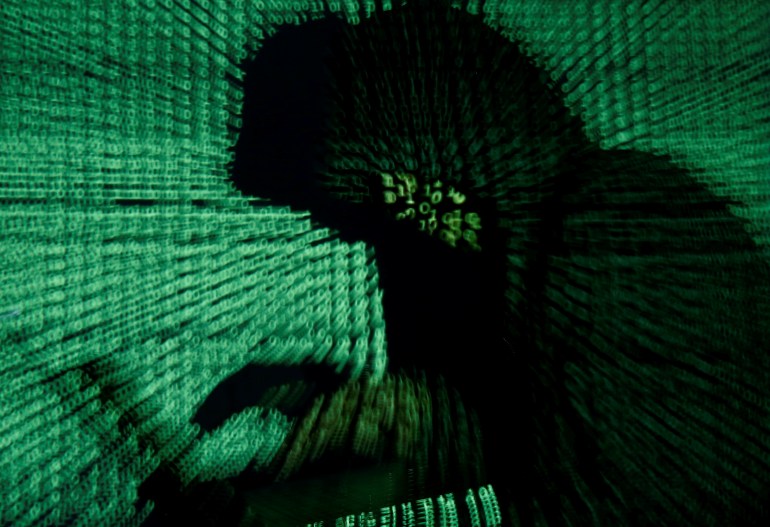
Ukraine crisis: Why is Macron taking on the role of mediator?
French President Emmanuel Macron, who faces an uncertain re-election bid, has attempted to position himself as the man capable of solving Europe’s mounting security crisis.
But his efforts appear to have hit a brick wall, with Moscow’s latest moves leaving the Minsk agreement – the troubled 2015 peace deal the French President had highlighted as the blueprint for avoiding war – in tatters.
Read more here.
During call with Putin, Erdogan addresses Russia’s moves
Turkey’s President Recep Tayyip Erdogan has told Putin that Ankara will not recognise any move against Ukraine’s sovereignty, his office says.
Erdogan warned during his phone call with Russia’s leader that military conflict in the region would not benefit anyone and repeated his offer to mediate between Moscow and Kyiv, a statement by his office said.
“President Erdogan, who renewed his call for the matter to be resolved through dialogue, stated that it was important to bring diplomacy to the forefront, and that [Turkey] continued its constructive stance in NATO as well,” the statement added.
NATO member Turkey, which borders Ukraine and Russia in the Black Sea, has good ties with both Kyiv and Moscow.
Poland says Russia’s actions pose a ‘threat’ to all of Europe
Poland’s president has condemned Russia’s moves in eastern Ukraine, saying they pose a threat to the entirety of Europe.
“Russia’s actions are of great concern to us. We take them very seriously,” President Andrzej Duda said during a joint news conference in Kyiv with his Ukrainian and Lithuanian counterparts.
“We believe that they pose a threat not only to Ukraine but to our entire region, to NATO’s eastern flank and the EU as a whole.”
‘Future of European security’ being decided in Ukraine, Zelenskyy says
Ukrainian President Volodymyr Zelenskyy says the “future of European security” will be decided in his country’s standoff with Russia.
“We are united in believing that the future of European security is being decided right now, here in our home, in Ukraine,” he told reporters in Kyiv.
Zelenskyy added that Kyiv wants security guarantees from Russia as a step towards ending the crisis.
“I believe that Russia should be among those countries that provide clear security guarantees. I have many times suggested that the President of Russia sit down at the negotiating table and speak,” he said, referring to Putin.
Russia starts pulling diplomatic staff from Ukraine
Russia has begun evacuating personnel from all of its diplomatic facilities in Ukraine, the TASS news agency reports.
Moscow’s embassy in Kyiv confirmed the evacuations were under way, TASS reported. Russia also has consulates in Kharkiv, Odesa and Lviv.
Russia’s foreign ministry promises strong response to US sanctions
Russia’s foreign ministry has said Moscow will respond strongly to new sanctions imposed by the US, arguing the measures imposed by the White House run counter to US interests.
“There should be no doubt – sanctions will meet a strong response, not necessarily symmetrical, but well-calibrated and sensitive for the American side,” the ministry said in a statement.
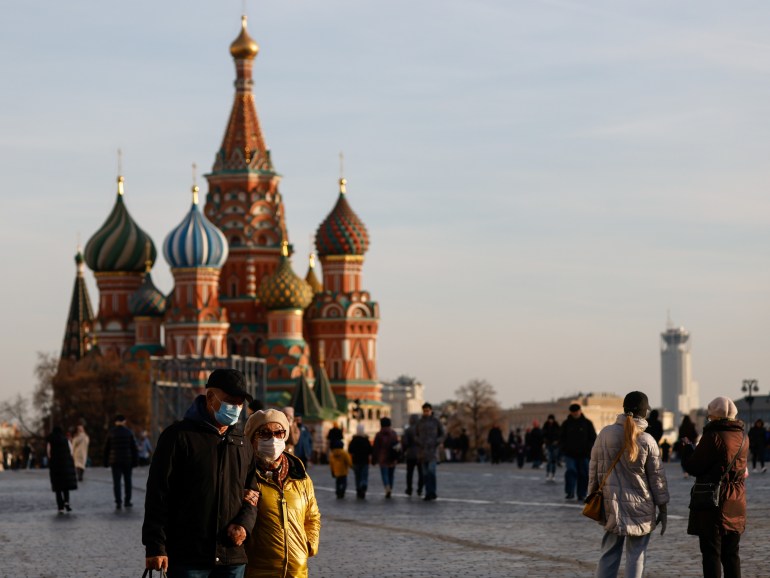
Iran denounces US, NATO ‘interference’ in Ukraine
Iran’s Foreign Minister Hossein Amirabdollahian has said the country is “not happy” with developments in Ukraine and accused the US and NATO of making “provocative moves”.
“In my phone calls with [the] foreign ministers of Russia and Ukraine last week I expressed the Islamic Republic’s clear views that NATO and US interference doesn’t help the situation … and that the solution is not war, but diplomatic discussions,” Amirabdollahian said at a joint press conference with his Omani counterpart Sayyid Badr al-Busaidi in Tehran.
Iran has not so far directly addressed Putin’s recognition of the self-proclaimed Donetsk People’s Republic (DPR) and Luhansk People’s Republic (LPR) in eastern Ukraine.
UK to provide Ukraine with ‘further package of military support’
The United Kingdom will provide further military support to Ukraine, including lethal defensive weapons, Prime Minister Boris Johnson says.
“In light of the increasingly threatening behaviour from Russia and in line with our previous support, the UK will shortly be providing a further package of military support to Ukraine. This will include lethal aid in the form of defensive weapons and non-lethal aid,” Johnson told parliament.
Separatist leader says military mobilisation accelerating
The Russian-backed leader of the Donetsk People’s Republic says that a military mobilisation in the breakaway region is gathering pace in order to counter Ukrainian “aggression”.
Denis Pushilin said the situation had become critical but the separatists would win with support from “big Russia”.
No one can change Russia’s recognition of breakaway Ukrainian regions, senior politician says
Andrey Turchak, a senior member of Russia’s governing United Russia party, has said that no force in the world can change the legal result of Russia’s recognition of the DPR and LPR.
On a visit to Donetsk, Turchak told separatist leader Pushilin that Russia would not abandon its people. He also claimed that 93,000 people had already been evacuated to Russia from the breakaway region.
Nord Stream 2 halted: What you should know
German Chancellor Olaf Scholz has put the certification of the Nord Stream 2 gas pipeline on ice in response to Russia’s moves in eastern Ukraine.
Read more here.
Ukraine to mobilise reserve forces
Ukraine’s military has put the country’s more than 200,000 reserve forces on notice that they will be mobilised as tensions with Russia escalate.
“Reservists aged 18 to 60 will be called up,” Ukrainian Ground Forces said in a Facebook message.
“The call will start today. The maximum service life is one year,” the military unit added.
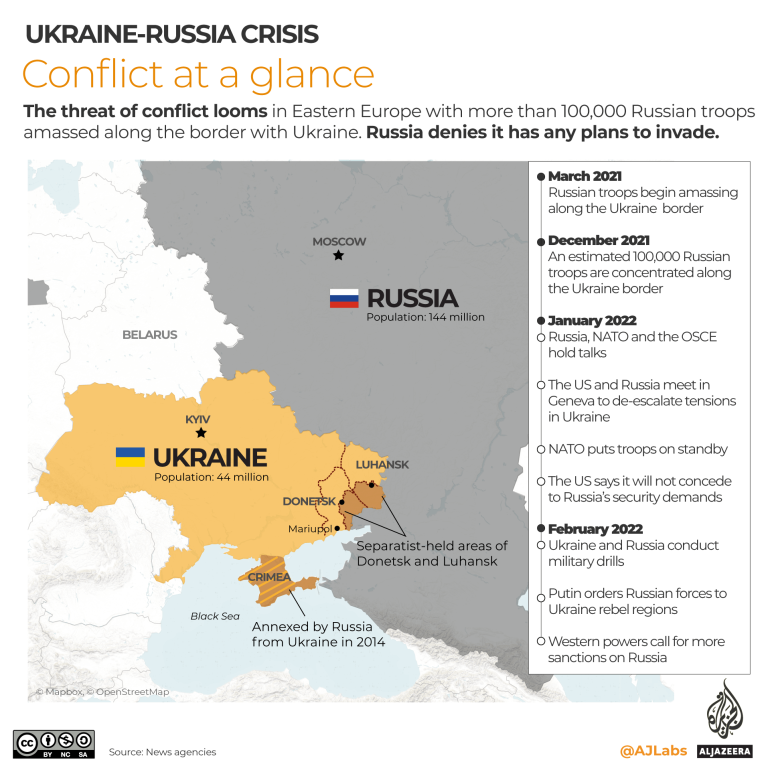
Ukraine to impose state of emergency, top security official says
Ukraine is set to impose a state of emergency on all of its territory, apart from the Donetsk and Luhansk regions where such a measure has already been in place since 2014, the country’s top security official says.
Oleksiy Danilov said that the measure would initially last for 30 days. It could be extended for another 30 days if required, he added.
The state of emergency must be formally approved by Ukraine’s parliament. A vote is expected to take place in the coming days.
Putin ‘tightening the screws on Ukraine’
Al Jazeera’s Bernard Smith, reporting from Moscow, says Putin is “continuing to tighten the screws on Ukraine”.
“He [Putin] says the two states that they have now recognised [the self-proclaimed Donetsk and Luhansk People’s Republics] are being recognised on embassy levels and Russia says it is also evacuating its diplomatic staff from Ukraine to protect their lives,” he said.
“Putin has also praised the battle readiness of Russian troops,” Smith added.
Russia’s FSB says it foiled ‘act of terrorism’ in annexed Crimea: Report
Russia’s Federal Security Service (FSB) claims it has foiled “an act of terrorism” in annexed Crimea and arrested six Russian citizens it said were supporters of a Ukrainian extremist group, the RIA Novosti news agency reports.
The FSB said it had also seized components for making explosive devices, RIA reported. The agency was expected to publish more details later.
Russia seized Crimea from Ukraine in early 2014.
Ukraine’s parliament votes to give permission for civilians to carry firearms
Ukraine’s parliament has voted to approve a draft law that gives permission to Ukrainians to carry firearms and act in self-defence.
“The adoption of this law is fully in the interests of the state and society,” the authors of the draft law said in a note, adding that the law was needed due to “existing threats and dangers for the citizens of Ukraine”.
Blinken cancels meeting with Russia’s Lavrov
US Secretary of State Antony Blinken has cancelled a meeting with Russian Foreign Minister Sergey Lavrov that was planned for Thursday.
Announcing the move, Blinken said he was still committed to diplomacy “if Moscow’s approach changes”. He added that he would do anything he could “to avert … an all-out assault on all of Ukraine, including its capital”.
Read more here.
Germany can do without Russian gas, minister says
Germany can meet its energy needs without Russian gas, the country’s economy minister has said.
Robert Habeck replied “yes, it can”, when asked on public radio if Europe’s largest economy could do without deliveries from Russia following Berlin’s decision to put the Nord Stream 2 project on pause.
Moscow is currently the largest supplier of natural gas to Germany.

Ukrainian politicians approve sweeping sanctions on hundreds of Russians
Ukraine’s parliament has approved imposing sanctions on 351 Russians, including politicians who supported the recognition of the independence of separatist-controlled territories and the use of Russian troops in eastern Ukraine.
The sanctions restrict almost all possible types of activities, in particular a ban on entry into Ukraine, and ban access to assets, capital, property and licences for business.
Ukraine’s security council was due to impose the sanctions after the vote.
Ukraine urges citizens to leave Russia
Ukraine’s foreign ministry has warned the country’s nationals not to visit Russia and urged its citizens already there to leave the country.
“The foreign ministry recommends that citizens of Ukraine refrain from any trips to the Russian Federation, and those who are in this country to leave its territory immediately,” the ministry said in a newly issued travel advisory.
UK to stop Russia selling sovereign debt in London
The United Kingdom will stop Russia from selling sovereign debt in London, UK Foreign Secretary Liz Truss says.
“We’ve been very clear that we’re going to limit Russian access to British markets,” Truss told Sky News. “We’re going to stop the Russian government with raising sovereign debt in the United Kingdom.
“There will be even more tough sanctions on key oligarchs, on key organisations in Russia, limiting Russia’s access to the financial markets, if there is a full-scale invasion of Ukraine.”
To limit sovereign debt sales in London, the UK would need additional legislation, according to Western officials. Clearing transactions would also be affected.
What sanctions have been imposed on Russia?
Several countries have moved to impose new sanctions on Russia in response to its recognition of two breakaway regions in eastern Ukraine and its ordering of troops into the territories.
Read more on the measures here.
China says sanctions never the best solution
Beijing has never thought sanctions are the best way to solve problems, China’s foreign ministry says.
China hopes relevant parties can try to resolve their issues through dialogue and remain calm and exercise restraint, ministry spokesperson Hua Chunying told reporters in Beijing.
Chunying had been asked if the Asian nation would join Western countries in sanctioning Russia.
Ukraine says one soldier killed in separatist shelling
The Ukrainian military says one soldier has been killed and six others wounded in shelling by pro-Russian separatists in east Ukraine in the past 24 hours as ceasefire violations remain at a high level.
The military said on its Facebook page it had recorded 96 incidents of shelling by separatists over the past 24 hours compared with 84 a day earlier. It said separatist forces used heavy artillery, mortars and Grad rocket systems.
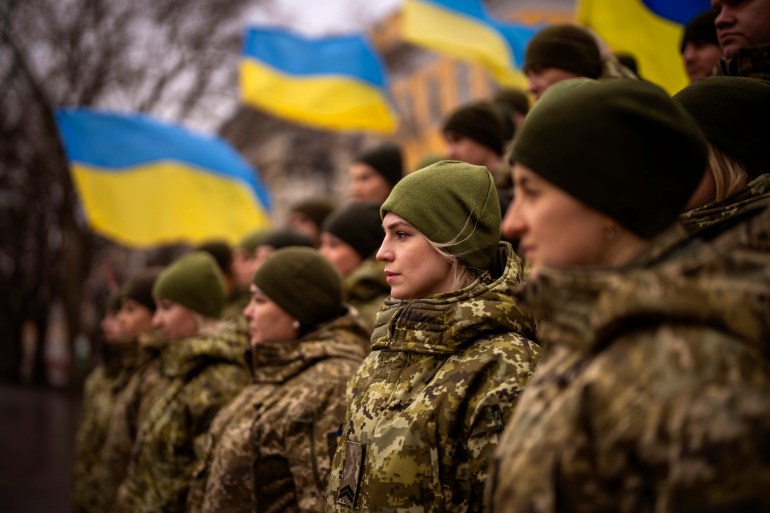
Pakistan PM to visit Moscow
Pakistani Prime Minister Imran Khan will embark on a two-day visit to Moscow on Wednesday for a high-level visit that will focus on regional security and a major gas pipeline deal.
Khan is due to hold talks with Russian President Vladimir Putin on Thursday, Putin’s office said in a statement.
A Pakistani foreign ministry statement said that the Putin-Khan summit-level talks will cover “major regional and international issues, including Islamophobia and [the] situation in Afghanistan”.
Notably absent from official statements around the visit has been any mention of the crisis in Ukraine. In an interview with Russian television station Russia Today, Khan said that he did not believe there was a military solution to the conflict in Ukraine and said that he hoped matters would be resolved through mediation.
Putin: Russia’s interests ‘non-negotiable’
Putin says Moscow is ready to look for “diplomatic solutions” to the crisis but has stressed that Russia’s interests are “non-negotiable”.
“Our country is always open for direct and honest dialogue, for the search for diplomatic solutions to the most complex problems,” he said in a video address to mark the Defender of the Fatherland Day, a public holiday in Russia.
But he added that “the interests of Russia, the security of our citizens, are non-negotiable for us”.
Putin spoke after parliament’s upper house, the Federation Council, on Tuesday gave him unanimous approval to deploy “peacekeepers” to two breakaway Ukrainian regions now recognised by Moscow as independent, and potentially into other parts of Ukraine.
Stocks steady, investors see space for war to be averted
Asian stocks have steadied and demand for safe havens waned as investors seem to have decided Russian troop movements near Ukraine and initial Western sanctions will leave room to avoid war.
“The market sees the various sanctions … as modest and perhaps not as aggressive as feared,” said Chris Weston, head of research at brokerage Pepperstone.
The commodity markets remain more nervous about the situation. Overnight, oil struck a seven-year high.
You can read more on what’s happening in the markets here.
Japan joins sanctions push
Prime Minister Fumio Kishida says Tokyo’s sanctions against Russia include measures banning the issuance of Russian bonds in Japan and freezing the assets of certain Russian individuals as well as restricting their travel to the country.
“Russia’s actions very clearly damage Ukraine’s sovereignty and go against international law. We once again criticise these moves and strongly urge Russia to return to diplomatic discussions,” Kishida said.
“The situation remains quite tense and we will continue to monitor it closely.”
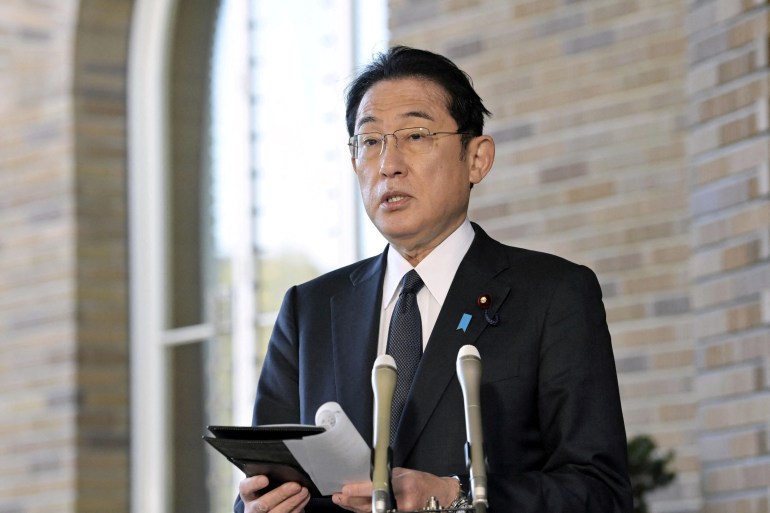
Taiwan to step up surveillance amid Ukraine crisis
Long wary about China, Taiwan says it will increase its surveillance and alertness for military activities in the region and tackle foreign misinformation.
President Tsai Ing-wen told a security meeting about Ukraine that all security and military units “must raise their surveillance and early warning of military developments around the Taiwan Strait”.
China claims Taiwan as its own and has stepped up military activities around the self-ruled island since Tsai was first elected in 2016.
Taiwan and Ukraine are fundamentally different in terms of geostrategy, geography and international supply chains, she said, according to a readout of the meeting provided by her office.
“But in the face of foreign forces intending to manipulate the situation in Ukraine and affect the morale of Taiwanese society, all government units must strengthen the prevention of cognitive warfare launched by foreign forces and local collaborators,” it cited Tsai as saying.
The statement did not mention China by name.
Australia to impose sanctions ‘immediately’
Australia has joined the US and UK in imposing sanctions on Russia, saying: “Australians always stand up to bullies.”
Speaking after an emergency meeting of the country’s national security council, Prime Minister Scott Morrison said the measures would be imposed “immediately” and target both individuals and entities.
Those targeted include eight members of Russia’s security council, as well as banks and businesses including transport, energy and telecommunications. Morrison declined to name the individuals but said they were the same as the people sanctioned by the US and the UK.
Australia has had sanctions in place since 2014, when Russia annexed Crimea and flight MH17 was shot down over eastern Ukraine, killing everyone on board.
After Guterres’s tough words, diplomats wonder what UN can do
Diplomats at the UN have welcomed Guterres’s hard-hitting statement on Russia’s moves in eastern Ukraine, but wonder what the organisation can actually do to resolve the issue, according to Al Jazeera’s Rosiland Jordan.
Speaking from the UN’s headquarters in New York, Jordan described Guterres’s statement as “eviscerating” and noted he had been incredibly critical of Moscow, pointing out that it was not for member states to “pick and choose” which part of the UN Charter they want to follow.
The key question for many diplomats, however, is what the UN secretary-general can do to follow up on the rhetoric and “what’s really going to be done behind the scenes to resolve this crisis without many people losing their lives in eastern Ukraine,” she said.
UK sanctions criticised as mere ‘slap on the wrist’
Some analysts and politicians say the sanctions being imposed on Russia are too weak.
Stephen Kinnock, a shadow minister in the UK’s main opposition Labour Party, said the measures imposed by London were a “slap on the wrist when something more hard-hitting was needed”.
Financier and campaigner Bill Browder also called the UK measures “pretty tepid” but said the US was making a “solid start”.
Canada announces sanctions on Russia, deploys troops to Latvia
Canada’s Prime Minister Justin Trudeau has announced a first set of sanctions on Russia, under which Canadians will be banned from buying Russian sovereign debt and from financial dealings with Luhansk and Donetsk.
Canada will also sanction members of the Russian parliament who voted to recognise Donetsk and Luhansk as independent as well as two state-backed Russian banks.
Trudeau is also sending more Canadian troops to Eastern Europe, with as many as 460 members of the Canadian Armed Forces, mostly to Latvia.
Satellite images show new military activity
US company Maxar Technologies has released a series of new satellite images that appear to show a fresh deployment of more than 100 military vehicles and dozens of troop tents in southern Belarus near the country’s border with Ukraine.
The images also included what Maxar said was a new field hospital, which has been added to a military garrison in western Russia near the border.
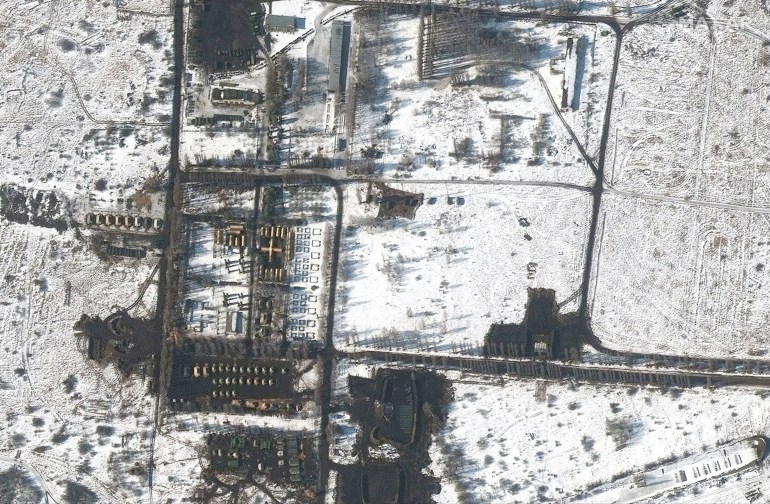
‘The time for sanctions is now’
Ukraine’s foreign minister has welcomed the US sanctions against Russian banks, calling on the world to use “all its economic might to punish Russia”.
Speaking alongside Blinken, Kuleba accused Putin of killing the Minsk Agreement that aimed to restore peace in eastern Ukraine with his recognition of the two breakaway Ukrainian regions.
“Russia’s move is a grave breach of international law and a new act of aggression against Ukraine’s sovereignty and territorial integrity. Therefore, Ukraine strongly believes that the time for sanctions is now,” he said.
UN chief condemns Russia’s troop deployment
Guterres has rejected Russian claims that troops deployed to eastern Ukraine will be “peacekeepers”.
“When troops of one country enter the territory of another country without its consent, they are not impartial peacekeepers. They are not peacekeepers at all,” the UN secretary-general told reporters in New York.
Guterres also dismissed Russia’s claims of a genocide taking place against ethnic Russians in eastern Ukraine.
Hello, and welcome to Al Jazeera’s continuing coverage of the Ukraine-Russia crisis.
Read all the updates from Tuesday, February 22, here.